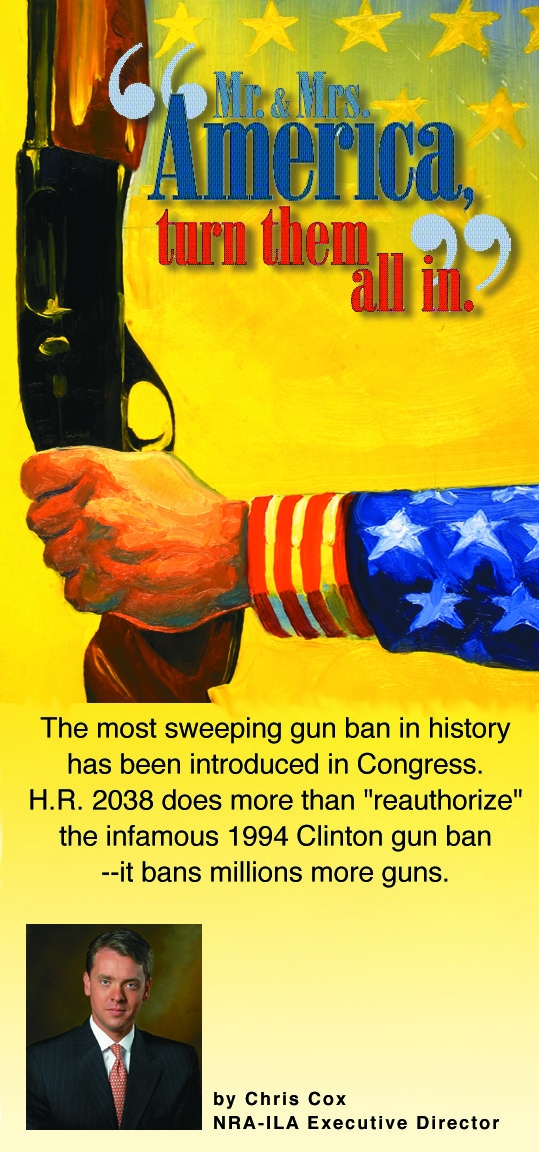
Bill Clinton's ban on semi-automatic firearms--guns that an anti-gun Congress re-defined as "assault weapons" in the 1994 crime bill--will expire Sept. 13, 2004. A drumbeat has begun in the national media to "reauthorize" the ban, and anti-gun legislators are dancing to that familiar beat.
In the House, H.R. 2038 has been introduced by Rep. Carolyn McCarthy (D-N.Y.). Instead of a "reauthorization" of the Clinton ban, McCarthy wants to ban millions of more guns and begin a backdoor national registration scheme.
|
All told, H.R. 2038 is a giant step closer to the goal stated by Clinton ban sponsor Sen. Dianne Feinstein (D-Calif.), on CBS' "60 Minutes"-- "If I could have gotten 51 votes in the Senate of the United States for an outright ban, picking up every one of them, Mr. and Mrs. America, turn them all in, I would have done it."
"Mr. and Mrs. America, turn them all in." Those are the only words gun owners should ever need to remember. Never has the anti-gun agenda been stated more succinctly or, for that matter, more honestly.
And now Sen. Feinstein is back trying to keep alive the ban Bill Clinton inflicted on law-abiding Americans. Joined by comrades such as Sens. Chuck Schumer and Ted Kennedy, she has introduced S.1034, the "Assault Weapons Ban Reauthorization Act of 2003." It makes the Clinton gun ban permanent and also bans the importation of large-capacity magazines. Certainly Feinstein's bill is less "ambitious" than McCarthy's and undoubtedly will be portrayed as a "reasonable," and "common-sense" alternative by firearm-phobic editorial writers at the New York Times and Washington Post.
The truth, of course, lies elsewhere and was admitted to recently by, of all people, Chuck Schumer, who confessed to the Los Angeles Times, "We know if we push it too far, we'll have no bill." Translation: "Don't threaten Mr. and Mrs. America too much." And don't remind them that the semi- automatic firearms they own for self-defense, hunting and target shooting function identically to those "assault weapons" you want to ban.
The "assault weapons" debate, as we saw in 1994, is most often ruled by emotion, not by fact, and therefore it was a tailor-made issue for the ethically challenged Clinton Administration and its allies. But the truth cannot be buried forever, not even in Washington, D.C.
|
That's exactly why, in the first election following enactment of the ban, gun owners went to the polls in great numbers and, for the first time in 134 years, unseated the U.S. Speaker of the House.
That's why Bill Clinton told the Cleveland Plain Dealer: "The fight for the assault weapons ban cost 20 members their seats in Congress."
That's why in March 1996, 239 members of the House of Representatives voted across party lines to repeal the Clinton gun ban.
The debate is not really about so-called "assault weapons." It's about banning guns. It's about gun prohibitionists searching for the easiest target of opportunity. They're going after guns that are scary-looking to many folks, claiming, without a shred of credible evidence, that these guns are the "weapons of choice" of criminals. It's a lie. A day after Bill Clinton signed his gun-banning crime bill into law, a Washington Post editorial admitted: "Assault weapons play a part in only a small percentage of crime. The provision is mainly symbolic; its virtue will be if it turns out to be, as hoped, a stepping stone to broader gun control."
|
In the words of Josh Sugarmann, leader of the radical Violence Policy Center: "The public's confusion over fully-automatic machine guns versus semi-automatic assault weapons--anything that looks like a machine gun is assumed to be a machine gun--can only increase the chance of public support for restrictions on these weapons." Machine guns were, of course, effectively banned in 1934.
Jacob Sullum, a senior editor at Reason magazine, captures the issue well: "The 'assault weapon' ban sets a dangerous precedent precisely because the justification for it is so weak. It suggests that you don't need a good reason to limit the right to keep and bear arms, and it invites further restrictions down the road. As far as the gun banners are concerned, that is the whole point."
|
Also see Chris W. Cox's letter to members of Congress in response to a "Dear Colleague" letter from Representatives John Conyers and Carolyn McCarthy seeking cosponsorship of their "Assault Weapons Ban and Law Enforcement Protection Act of 2003."













 More Like This From Around The NRA
More Like This From Around The NRA





